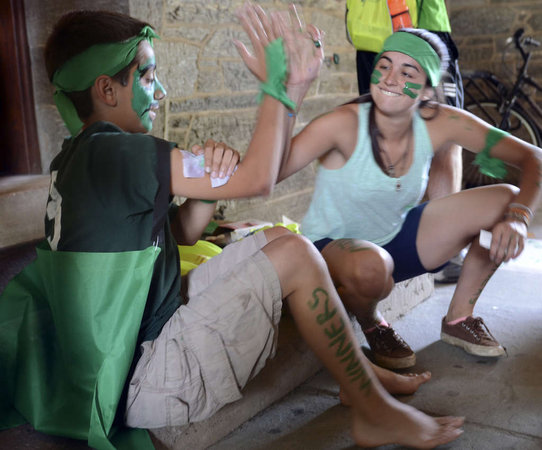By Kristin E. Holmes Philadephia Inquirer

Ana Baena of Spain and Phil Garbarini of West Chester share a high-five as they finish applying body paint to represent the green team at the Peace Games. (Tom Gralish)
The gesture seemed a small one between young adults whose fathers had died at the hands of terrorists.
Mijal Tenenbaum, 19, was talking about her father’s death in the 1994 bombing of a Jewish community center in Buenos Aires.
Adrien Abescat, whose father was shot and killed in front of him, reached over to hold her hand.
The friends – one from Argentina, the other from France – shared a tragic circumstance with 58 other young people who gathered for a week at Bryn Mawr College.
All have lost family members to terrorism. For seven days, they were surrounded by people who know exactly how they feel.
They were part of Project Common Bond, an annual camp designed to help young people heal through sharing their experiences, and to turn them into leaders with peacemaking skills that they can use in their communities.
“To come here and be able to talk about what we are dealing with and how we are going forward, that is amazing,” said Abescat, 21, of Nice, whose father was killed in Saudi Arabia.
The camp is part of Tuesday’s Children, a nonprofit in Manhasset, N.Y., that was founded after September 11, 2001. Tuesday’s Children offers programs and services to people directly affected by the attacks, including counseling, life-management training, youth mentorship, and mental health programming.
Project Common Bond, launched in 2008, was first aimed at youths who had lost family members on 9/11. Later, the program was expanded to include young people with similar experiences from around the world.
The program is not designed to be “a therapy camp,” said Monica Meehan, the project’s curriculum director. But emotional healing is an outgrowth of sharing experiences.
Young people from 12 countries participated in this year’s camp, which ended Wednesday. They have experienced the aftermath of violence in a civil war in Sri Lanka, shooting attacks in Saudi Arabia, and religious conflict in Africa.
Max Arczynski, 20, and Andrew Charette, 18, lost their fathers in the attacks on the World Trade Center.
“Truthfully, my first year here, my mom pushed me to come,” said Charette, of Millburn, N.J. “It sounded like a lot of stuff I wasn’t comfortable with. Talking wasn’t how I coped.”
The same goes for Arczynski.
“I lived my life pretending it didn’t happen,” said the college sophomore from Stowe, Vt.
But the atmosphere at Project Common Bond helped them feel safe enough to share.
“You can be true to yourself at all times,” Charette said.
The campers spent their days in daily dialogue sessions and mediation skills training. They participated in art, music, dance, drama, and sports workshops.
They also made a somber visit to the National September 11 Memorial and Museum in lower Manhattan.
Peace activist Zak Ebrahim, whose father was convicted of conspiring to bomb the World Trade Center in 1993, came to deliver a lecture to the campers.
“I don’t think they want to be defined by what happened to them,” said Kathy Murphy, the camp’s project director. “They want to use that experience to help someone else.”
Salmah Garba may not always be defined by what happened to her, but she will always have the scars.
Garba, 20, of Jos, Nigeria, was burned on her arms when her family’s house was set on fire as part of the religious conflict in the country. Garba’s father and two brothers died in the blaze.
Through a translator, Garba said that the most important thing she learned at Project Common Bond was about “peace talks.”
“If there is peace,” Garba said, “then there wouldn’t be violence, and what I have experienced, I wouldn’t have gone through.”

